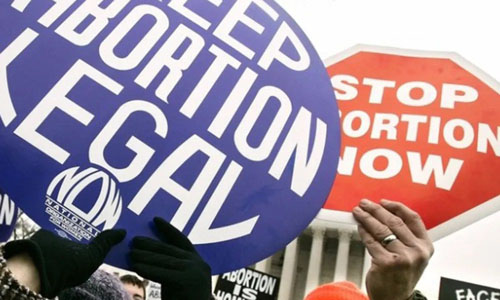by WorldTribune Staff, January 3, 2020
A coalition of lawmakers from both houses of Congress has filed a legal brief asking the Supreme Court to reconsider Roe v. Wade, the 1973 landmark decision which created abortion rights.
The group includes 39 senators and 168 members of the House of Representatives. Their legal brief argues that abortion case law is “radically unsettled” and should be reconsidered, The Daily Caller noted in a Jan. 2 report.
 The filing was submitted in a case the Supreme Court will hear in March which involves a challenge to Louisiana rules that require abortion providers to have admitting privileges at a nearby hospital.
The filing was submitted in a case the Supreme Court will hear in March which involves a challenge to Louisiana rules that require abortion providers to have admitting privileges at a nearby hospital.
“Forty-six years after Roe was decided, it remains a radically unsettled precedent: two of the seven Justices who originally joined the majority subsequently repudiated it in whole or in part, and virtually every abortion decision since has been closely divided,” the brief reads.
Americans United for Life (AUL) prepared the Jan. 2 filing. The Senate leaders of the coalition are Republican Sens. John Kennedy of Louisiana and Marsha Blackburn of Tennessee. The House leaders are House Minority Whip Steve Scalise and Rep. Michael Johnson, both Louisiana Republicans.
In arguing that Roe v. Wade’s staying power is diminished, the coalition pointed to what is said was the frequent revision of abortion rules.
The lawmakers cited the Supreme Court’s 1992 Casey decision which involved a Pennsylvania law requiring doctors to counsel patients about abortion 24 hours before the procedure and obtain parental consent if the patient is a minor, among other things. The high court upheld those requirements. In so doing, it overturned two decisions from the 1980s that blocked comparable regulations.
A similar sequence preceded the 2007 Gonzalez v. Carhart decision, the lawmakers noted. In Gonzalez, the high court upheld the federal Partial-Birth Abortion Ban Act, which prohibited a termination method called intact dilation and extraction. Just seven years before Gonzalez, however, the justices struck down a Nebraska law much like the federal PBA ban.
“These incessant retrenchments show that Roe has been substantially undermined by subsequent authority, a principal factor the Court considers when deciding whether to overrule precedent,” the brief reads. “Casey clearly did not settle the abortion issue, and it is time for the Court to take it up again.”
In the Louisiana dispute, a law called Act 620 requires that abortion providers have admitting privileges at a local hospital. Lawyers for the state told the justices in legal briefs that the law “improves abortion safety by means of doctor credentialing,” since the admitting privileges application process ensures a high level of physician competency. The requirement is necessary, the state’s legal brief argues, because of the “long, disturbing history of serious health and safety problems” in Louisiana abortion clinics.
The Daily Caller’s report noted that a coalition of providers challenging Act 620 say admitting privileges have little bearing on professional fitness. Privileges are sometimes conditioned on factors having nothing to do with ability, like admitting a certain number of patients each year. As such, the providers believe the law’s true purpose is to close abortion clinics by imposing needless requirements with which physicians can’t realistically comply.
A federal trial judge agreed, finding two of Louisiana’s three abortion clinics would close if Act 620 were enforced. The judge said the increased wait times and travel distances which would follow create an “undue burden” on abortion access.
The 5th U.S. Circuit Court of Appeals reversed and upheld the law, so the plaintiff physicians appealed to the Supreme Court. The justices said the law could not take effect while litigation continued in February 2019. Arguments in the case are scheduled for March 4, with a decision to follow by June.
Approximately 10,000 abortions are performed in Louisiana each year.
Intelligence Brief __________ Replace The Media
